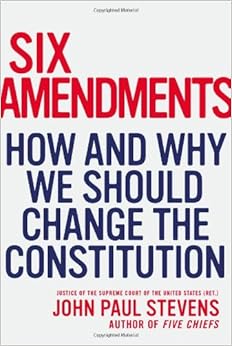Six Amendments: How and Why We Should Change the Constitution is the latest scholarly work from former Supreme Court Justice John Paul Stevens. The book is as spare and strictly to-the-point as its title: discounting an index, a few pages of acknowledgements, a few more pages of glossy colour photographs, and an appendix with a complete transcription of the United States Constitution (as amended), Stevens makes his case for six distinct constitutional amendments in just 133 pages.  As a retired Justice, it isn’t surprising that the selection and emphasis of many of the proposals underscore Steven’s frustration with often recently decided jurisprudence and are targeted to undermine or reverse certain decisions. The no-nonsense prose, coloured with Stevens’s famed wit, makes for an engaging and insightful read.
As a retired Justice, it isn’t surprising that the selection and emphasis of many of the proposals underscore Steven’s frustration with often recently decided jurisprudence and are targeted to undermine or reverse certain decisions. The no-nonsense prose, coloured with Stevens’s famed wit, makes for an engaging and insightful read.
No proposed amendment is immune to critique, and some are less immune than others. But a majority of them clearly address pressing contemporary issues that likely need profound and dramatic legal changes to adequately remedy. The biggest challenge to Stevens’s proposed remedies is one he himself addresses in a short prologue: namely that the amendment process has been very infrequently used, and never more infrequently since the Civil War than in the last forty years. But, by suggesting remarkably simple yet concrete changes we could actually act upon, Stevens makes a powerful case that there are ways we can effect change more more decisively than what the slow and piecemeal legislative process may afford and less unexpectedly than ‘law from the bench’ often provides. I’ll discuss each proposal in turn.